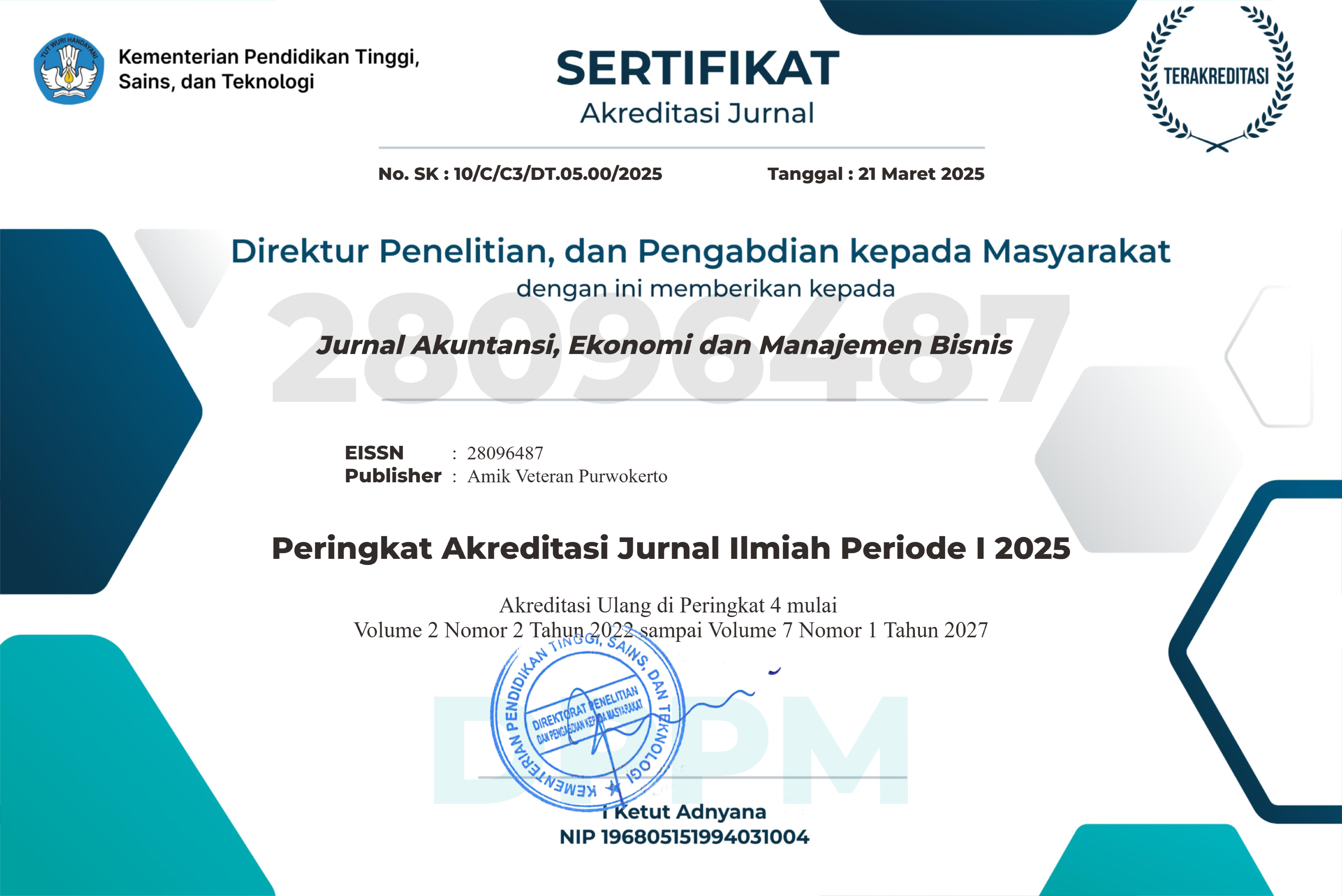Netflix dan Mahasiswa: Analisis Empiris Perceived Value, Brand Engagement, dan Niat Penggunaan Lanjutan
DOI:
https://doi.org/10.55606/jaemb.v5i1.6195Keywords:
Perceived Value, Customer Brand Engagement, Continuance Usage Intention, Netflix, University StudentsAbstract
This study aims to analyze the effect of perceived value on continuance usage intention with customer brand engagement as a mediating variable in the context of Netflix video-on-demand service usage among students of the Faculty of Economics and Business, Universitas Negeri Padang. A quantitative approach was employed using a survey method through the distribution of questionnaires via Google Form. A total of 90 respondents were included in the sample. Data analysis was conducted using SmartPLS 3. The results reveal that perceived value has a positive but not statistically significant direct effect on continuance usage intention. In contrast, perceived value has a positive and significant effect on customer brand engagement, which in turn significantly influences continuance usage intention. Furthermore, customer brand engagement mediates the relationship between perceived value and continuance usage intention. These findings indicate that consumer engagement with the brand plays a crucial role in strengthening the impact of perceived value on the intention to continue using the service. The practical implication of this study suggests that Netflix should focus on enhancing consumer perceived value through content and pricing strategies, while also fostering emotional, cognitive, and behavioral engagement to sustain user loyalty and service continuity, particularly among university students.
References
Adam, K., & Irwan. (2015). Metode Partial Least Square (PLS) Dan Terapannya (Studi Kasus: Analisis Kepuasan Pelanggan terhadap Layanan PDAM Unit Camming Kab. Bone). 53–68.
Chen, Y.-R. R. (2017). Perceived values of branded mobile media, consumer engagement, business-consumer relationship quality and purchase intention: A study of WeChat in China. Public Relations Review, 43, 945–954. https://doi.org/10.1016/J.PUBREV.2017.07.005
Fergus Putri, A. R., & Paksi, A. K. (2021). the Strategy of Netflix To Dominate the Entertainment Media Market in Indonesia 2016-2021. Jurnal Ilmiah Dinamika Sosial, 5(1), 110–134. https://doi.org/10.38043/jids.v5i1.3049
Friederich, F., Palau-Saumell, R., Matute, J., & Meyer, J. H. (2024). Digital natives and streaming TV platforms: an integrated perspective to explain continuance usage of over-the-top services. Online Information Review, 48(1), 1–21. https://doi.org/10.1108/OIR-03-2022-0133
Guste, R. R. A., & Ong, A. K. S. (2024). Machine Learning Decision System on the Empirical Analysis of the Actual Usage of Interactive Entertainment: A Perspective of Sustainable Innovative Technology. Computers, 13(6). https://doi.org/10.3390/computers13060128
Hair, J. F., C. Black, W., J. Babin, B., & E. Anderson, R. (2010). Multivariate Data Analysis (7th Edition) ( PDFDrive ).pdf (p. 816 pages).
Jia, X., Pang, Y., Huang, B., & Hou, F. (2023). Understanding consumers’ continuance intention to watch streams: A value-based continuance intention model. Frontiers in Psychology, 14. https://doi.org/10.3389/fpsyg.2023.1073301
Lestari, E., & Soesanto, O. R. C. (2020). PREDICTING FACTORS THAT INFLUENCE ATTITUDE TO USE AND ITS IMPLICATIONS ON CONTINUANCE INTENTION TO USE SVOD: STUDY ON NETFLIX USERS OF INDONESIA [PREDIKSI FAKTOR-FAKTOR YANG MEMPENGARUHI SIKAP PENGGUNAAN DAN IMPLIKASINYA TERHADAP KEBERLANJUTAN NIAT PENGGU. DeReMa (Development Research of Management): Jurnal Manajemen, 15(2), 183. https://doi.org/10.19166/derema.v15i2.2541
Ma, Y., Ruangkanjanases, A., & Chen, S. C. (2019). Investigating the impact of critical factors on continuance intention towards cross-border shopping websites. Sustainability (Switzerland), 11(21). https://doi.org/10.3390/su11215914
Marela, A. N., & Alfansi, L. (2024). Understanding Gen Z’s Netflix usage in Indonesia: an Extended TAM perspective on willingness to subscribe. Manajemen Dan Bisnis, 23(1), 13. https://doi.org/10.24123/mabis.v23i1.738
Masao, M., & Salehudin, I. (2023). Unveiling the Dynamics of Expectation, Flow, Enjoyment, and Satisfaction: Drivers of Continued Subscription Intentions Among Netflix Users. The South East Asian Journal of Management, 17(2), 96–121. https://doi.org/10.21002/seam.v17i2.1410
Meliawati, T., Gerald, S. C., & Akhmad Edhy Aruman. (2023). The Effect of Social Media Marketing TikTok and Product Quality Towards Purchase Intention. Journal of Consumer Sciences, 8(1), 77–92. https://doi.org/10.29244/jcs.8.1.77-92
Ngoc, N. M., Hanh, D. H., Hà, N., Nhung, P., & Phượng, N. T. (2020). Mediating Effect of Social Commerce Continuance Use Intention on the Relationship Between Perceived Values and Brand Loyalty. European Journal of Business and Management. https://doi.org/10.7176/ejbm/12-11-07
Nugroho, M. A., Setyorini, D., & Novitasari, B. T. (2019). The role of satisfaction on perceived value and e-learning usage continuity relationship. Procedia Computer Science, 161, 82–89. https://doi.org/10.1016/j.procs.2019.11.102
Puntoni, S., Reczek, R. W., Giesler, M., & Botti, S. (2021). Consumers and Artificial Intelligence: An Experiential Perspective. Journal of Marketing, 85(1), 131–151. https://doi.org/10.1177/0022242920953847
Rakhmawati, A., Pandjaitan, F. L., & Srihardianti, M. (2023). INTEGRATING PERCEIVED VALUE AND TECHNOLOGY ACCEPTANCE MODEL ON FUTURE USE OF. JOURNAL OF LIAONING TECHNICAL UNIVERSITY, 17(10).
Sugiyono (2019). Metode Penelitian Kuantitatif, Kualitatif, dan R&D. Bandung
Touni, R., Kim, W., Haldorai, K., & Rady, A. (2022). Customer engagement and hotel booking intention: The mediating and moderating roles of customer-perceived value and brand reputation. International Journal of Hospitality Management. https://doi.org/10.1016/j.ijhm.2022.103246
Wu, T., Jiang, N., Kumar, T. B. J., & Chen, M. (2024). The role of cognitive factors in consumers’ perceived value and subscription intention of video streaming platforms: a systematic literature review. Cogent Business and Management, 11(1). https://doi.org/10.1080/23311975.2024.2329247
Wu, Y., & Huang, H. (2023). Influence of Perceived Value on Consumers’ Continuous Purchase Intention in Live-Streaming E-Commerce—Mediated by Consumer Trust. Sustainability (Switzerland), 15(5). https://doi.org/10.3390/su15054432
Downloads
Published
How to Cite
Issue
Section
License
Copyright (c) 2025 Jurnal Akuntansi, Ekonomi dan Manajemen Bisnis

This work is licensed under a Creative Commons Attribution-ShareAlike 4.0 International License.








